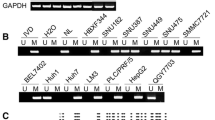Abstract
Background
Aberrant CpG island hypermethylation is a major epigenetic mechanism that can inactivate the transcription of cancer-related genes.
Purpose
This study aimed to investigate whether Oct-6 transcription was regulated by CpG island methylation in hepatocellular carcinoma (HCC).
Methods
Quantitative real-time PCR and the MassARRAY platform (Sequenom) were employed in 38 HCC tissues samples and four cell lines.
Results
The levels of Oct-6 mRNA were decreased by more than twofold in 31 of 38 tumor tissues compared to that of adjacent non-cancerous tissues. Among the 31 tumor tissues with lower levels of Oct-6 mRNA, 17 tumor tissues also had higher methylation levels in Oct-6 CpG island. Based on these results, we hypothesized that CpG island hypermethylation may down-regulate Oct-6 mRNA expression in HCC. To confirm this hypothesis, we also analyzed the changes in Oct-6 mRNA expression and CpG island methylation in four HCC cell lines (Huh7, Bel-7402, HepG2 and SMMC-7721) after treatment with 0.1, 0.5 and 2.5 μM 5-Aza-2-deoxycytidine (5-Aza-CdR), a demethylating agent. The results demonstrated that the CpG island methylation levels decreased and Oct-6 mRNA levels increased in a dose-dependent manner in both Huh7 and Bel7402 cells, but there were only slight changes in HepG2 cell. Interestingly, there were no significant alterations of Oct-6 mRNA levels observed in SMMC7721 cell; although lower levels of CpG island methylation were detected after treatment with 5-Aza-CdR.
Conclusions
Our study shows that CpG island hypermethylation contributes to down-regulation of Oct-6 mRNA expression in HCC.



Similar content being viewed by others
References
Lai EC, Lau WY. The continuing challenge of hepatic cancer in Asia. Surgeon. 2005;3:210–215.
Kew MC. Epidemiology of hepatocellular carcinoma. Toxicology. 2002;181–182:35–38.
Lau WY, Lai EC. Hepatocellular carcinoma: Current management and recent advances. Hepatobiliary Pancreat Dis Int. 2008;7:237–257.
Herman JG, Baylin SB. Gene silencing in cancer in association with promoter hypermethylation. N Engl J Med. 2003;349:2042–2054.
Garinis GA, Patrinos GP, Spanakis NE, Menounos PG. DNA hypermethylation: When tumour suppressor genes go silent. Hum Genet. 2002;111:115–127.
Robertson KD. DNA methylation and human disease. Nat Rev Genet. 2005;6:597–610.
Tischoff I, Tannapfel A. DNA methylation in hepatocellular carcinoma. World J Gastroenterol. 2008;14:1741–1748.
Yu J, Zhang HY, Ma ZZ, Lu W, Wang YF, Zhu JD. Methylation profiling of twenty four genes and the concordant methylation behaviours of nineteen genes that may contribute to hepatocellular carcinogenesis. Cell Res. 2003;13:319–333.
Lee S, Lee HJ, Kim JH, Lee HS, Jang JJ, Kang GH. Aberrant CpG island hypermethylation along multistep hepatocarcinogenesis. Am J Pathol. 2003;163:1371–1378.
Moribe T, Iizuka N, Miura T, et al. Methylation of multiple genes as molecular markers for diagnosis of a small, well-differentiated hepatocellular carcinoma. Int J Cancer. 2009;125:388–397.
Hofmann E, Reichart U, Gausterer C, et al. Octamer-binding factor 6 (Oct-6/Pou3f1) is induced by interferon and contributes to dsRNA-mediated transcriptional responses. BMC Cell Biol. 2010;11:61.
Faus I, Hsu HJ, Fuchs E. Oct-6: A regulator of keratinocyte gene expression in stratified squamous epithelia. Mol Cell Biol. 1994;14:3263–3275.
Livak KJ, Schmittgen TD. Analysis of relative gene expression data using real-time quantitative PCR and the 2-ΔΔCt method. Methods. 2001;25:402–408.
Ehrich M, Zoll S, Sur S, van den Boom D. A new method for accurate assessment of DNA quality after bisulfite treatment. Nucleic Acids Res. 2007;35:e29.
Lin HJ, Zuo T, Lin CH, et al. Breast cancer-associated fibroblasts confer AKT1-mediated epigenetic silencing of Cystatin M in epithelial cells. Cancer Res. 2008;68:10257–10266.
Zhu J. DNA methylation and hepatocellular carcinoma. J Hepatobiliary Pancreat Surg. 2006;13:265–273.
Zhang C, Guo X, Zhang L, et al. Methylation-related silencing of p14ARF gene correlates with telomerase activity and mRNA expression of human telomerase reverse transcriptase in hepatocellular carcinoma. J Surg Oncol. 2008;98:462–468.
Li X, Hui AM, Sun L, et al. p16INK4A hypermethylation is associated with hepatitis virus infection, age, and gender in hepatocellular carcinoma. Clin Cancer Res. 2004;10:7484–7489.
Kaneto H, Sasaki S, Yamamoto H, et al. Detection of hypermethylation of the p16(INK4A) gene promoter in chronic hepatitis and cirrhosis associated with hepatitis B or C virus. Gut. 2001;48:372–377.
Stone AR, Bobo W, Brat DJ, Devi NS, Van Meir EG, Vertino PM. Aberrant methylation and down-regulation of TMS1/ASC in human glioblastoma. Am J Pathol. 2004;165:1151–1161.
Acknowledgments
This work was supported by Key Programs for Science and Technology Development of Guangzhou (Grant no. 2008A1-E4151) and the National High Technology Research and Development Program of China (Grant no. 2006AA02A311).
Author information
Authors and Affiliations
Corresponding authors
Additional information
Jing-zhe Sun and Xue-xi Yang contributed equally to this study.
Rights and permissions
About this article
Cite this article
Sun, Jz., Yang, Xx., Li, Xh. et al. Aberrant CpG Island Hypermethylation and Down-Regulation of Oct-6 mRNA Expression in Human Hepatocellular Carcinoma. Dig Dis Sci 56, 3072–3077 (2011). https://doi.org/10.1007/s10620-011-1686-y
Received:
Accepted:
Published:
Issue Date:
DOI: https://doi.org/10.1007/s10620-011-1686-y




